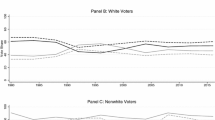Abstract
The question we are asking in this chapter is: does class background differentiate men and women in positions of public power, and if so how? Our hypothesis is that women leaders come from higher class backgrounds than male leaders, and the evidence suggests that, in most of the dimensions of class examined, there is a significant relationship between gender and class in the direction proposed.
Access this chapter
Tax calculation will be finalised at checkout
Purchases are for personal use only
Preview
Unable to display preview. Download preview PDF.
Similar content being viewed by others
Editor information
Editors and Affiliations
Copyright information
© 2000 International Political Science Association
About this chapter
Cite this chapter
Liddle, J., Michielsens, E. (2000). Gender, Class and Public Power. In: Vianello, M., Moore, G. (eds) Gendering Elites. Advances in Political Science: An International Series. Palgrave Macmillan, London. https://doi.org/10.1007/978-1-349-62882-7_3
Download citation
DOI: https://doi.org/10.1007/978-1-349-62882-7_3
Publisher Name: Palgrave Macmillan, London
Print ISBN: 978-1-349-62884-1
Online ISBN: 978-1-349-62882-7
eBook Packages: Palgrave Political & Intern. Studies CollectionPolitical Science and International Studies (R0)




